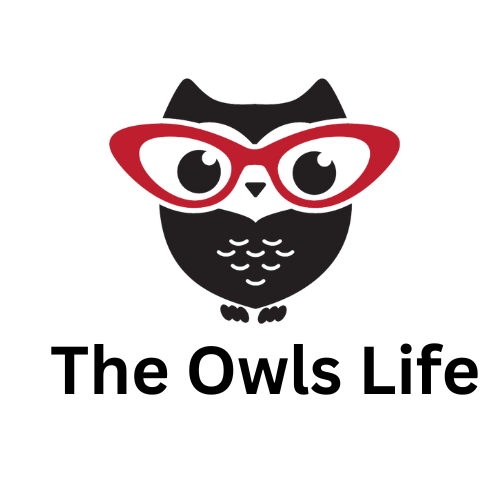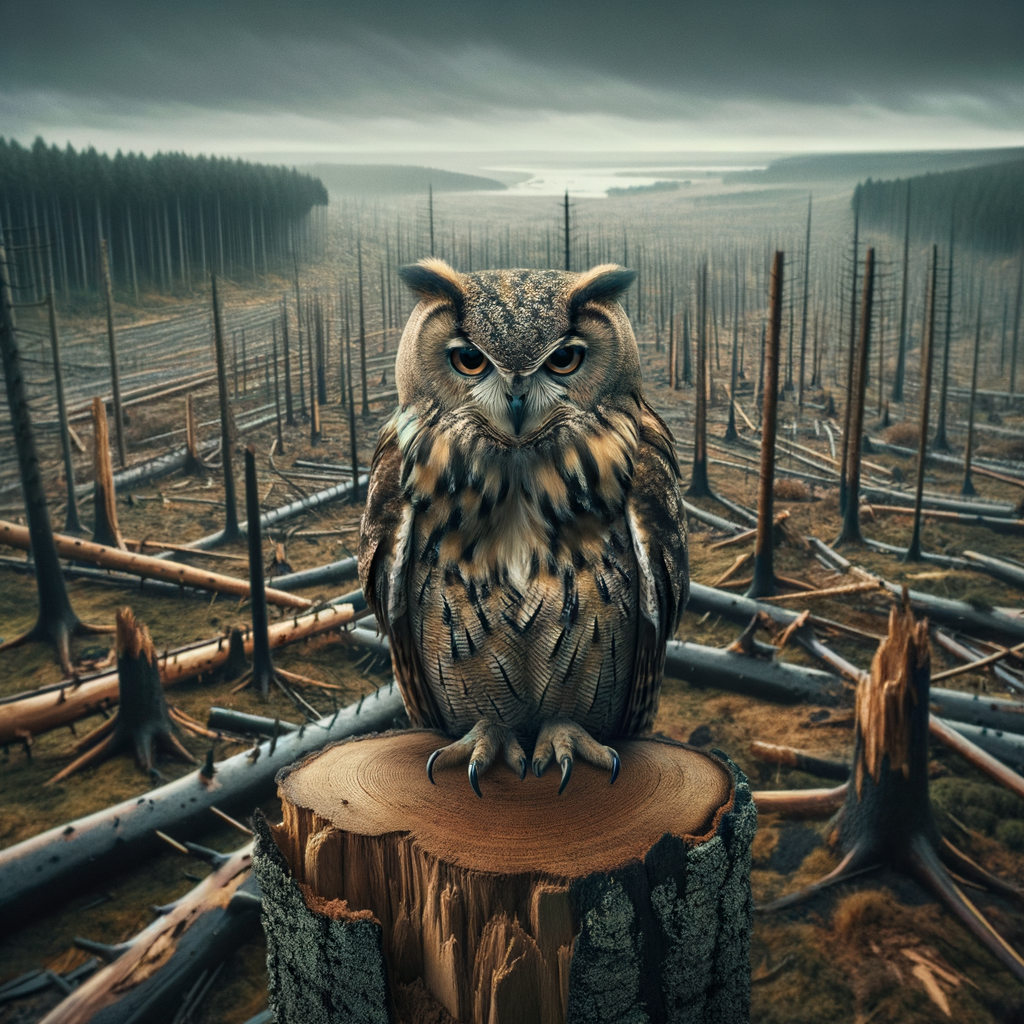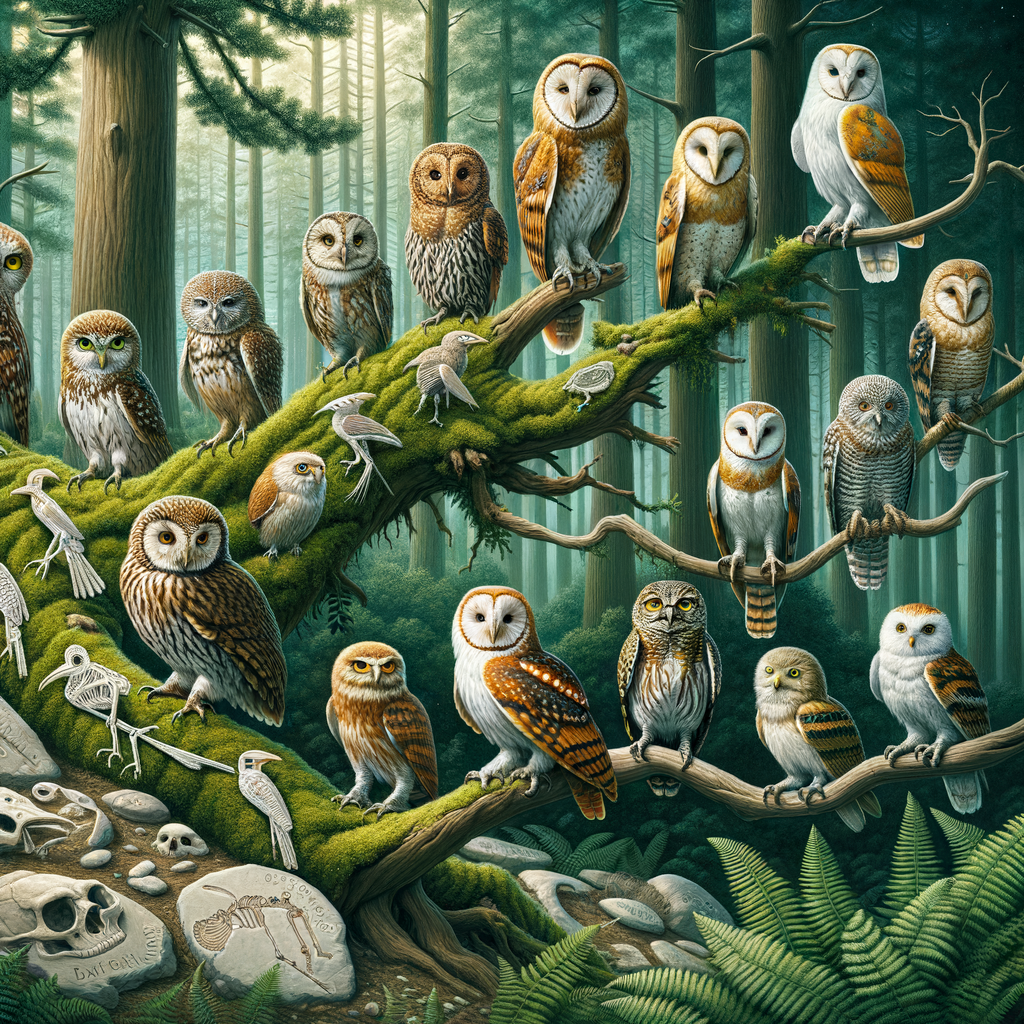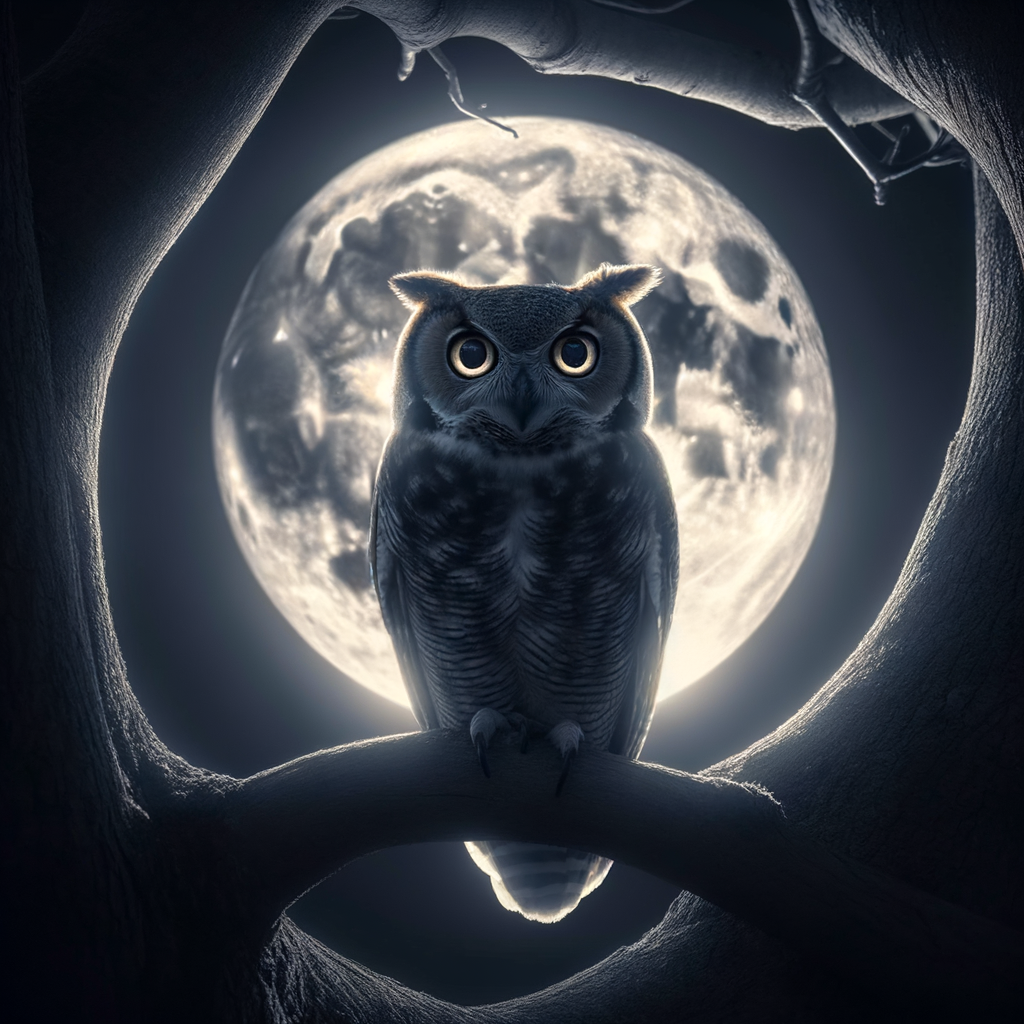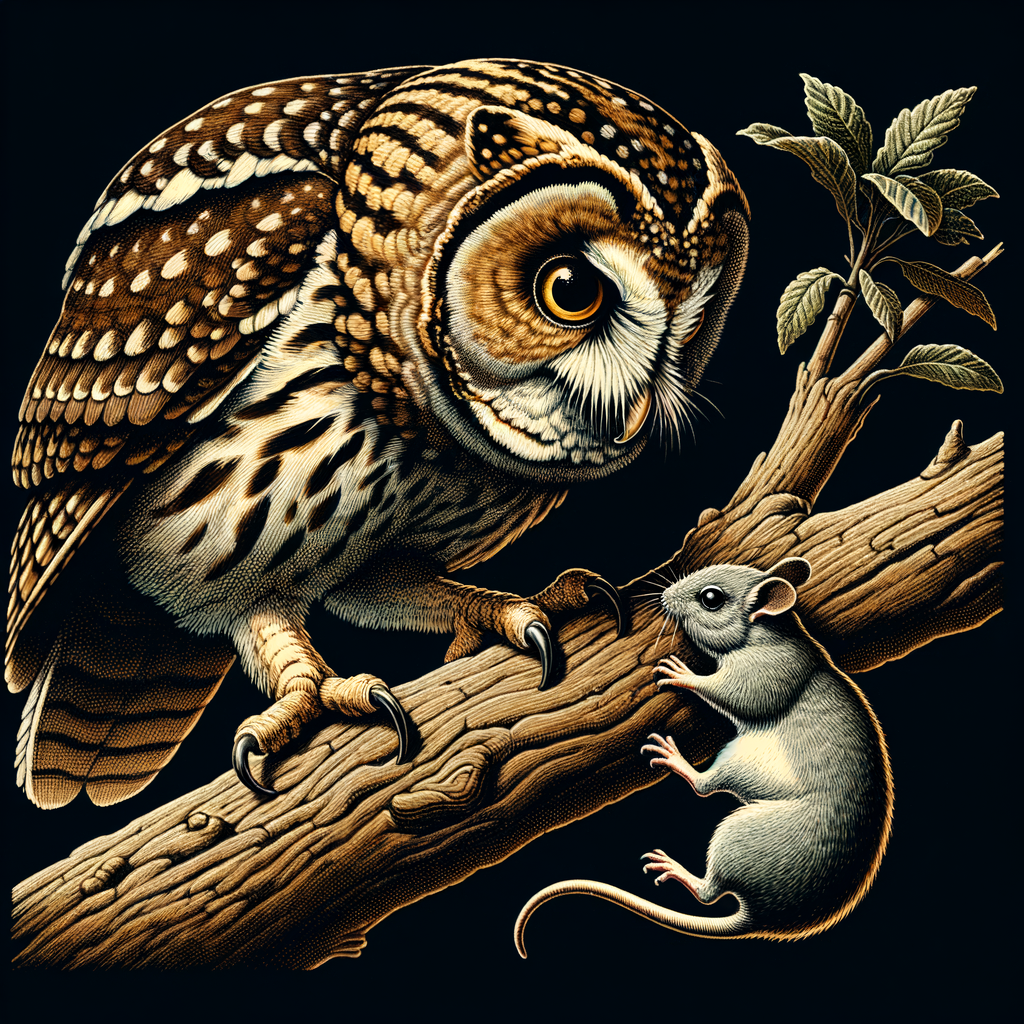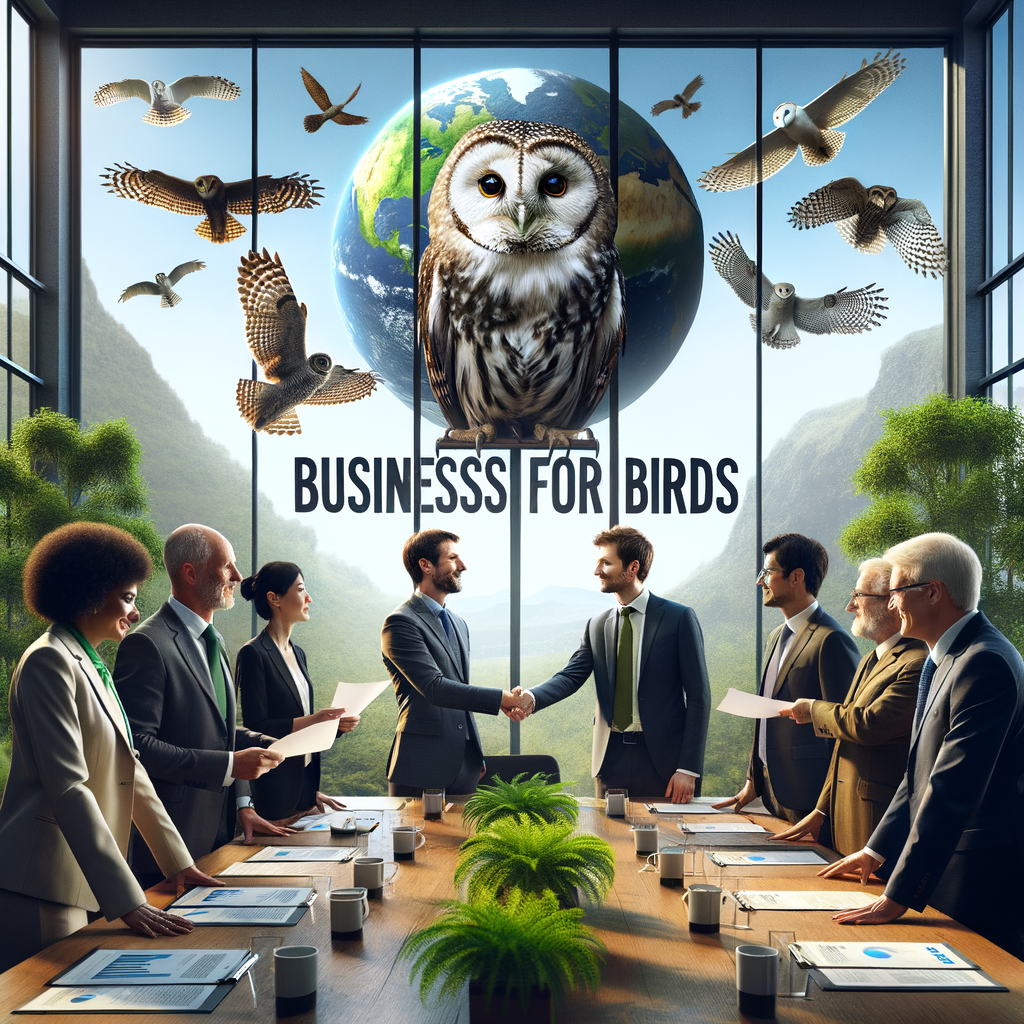
Introduction to Owl Conservation
When we think about conservation, we often focus on the more famous animals like lions, elephants, or pandas. But there’s another group of creatures that need our help just as much – owls. These mysterious and beautiful birds play a crucial role in our ecosystem, and their conservation is more important than ever.
- The Importance of Owl Conservation
- Threats Facing Owl Populations
- Role of Businesses in Wildlife Conservation
Owls are a vital part of our environment. They help control the population of rodents and other small animals, which can become pests if their numbers get too high. Owls also serve as an indicator of the health of our ecosystems. A decline in owl populations often signals problems in the environment that could affect other species as well.
Unfortunately, owls face many threats. Habitat loss due to deforestation and urban development is one of the biggest challenges. Pesticides used in farming can poison owls and their prey, while climate change is altering the habitats where owls live. Illegal hunting and trafficking are also significant threats.
Businesses can play a significant role in wildlife conservation, including the protection of owls. They can support conservation efforts through funding and partnerships with environmental organizations. They can also adopt sustainable practices that reduce their impact on the environment, such as minimizing waste and reducing carbon emissions. Some companies even create products that directly support conservation, like bird-friendly coffee that helps preserve owl habitats.
In conclusion, owl conservation is a critical issue that requires our attention. By understanding the importance of owls, the threats they face, and the role businesses can play in their protection, we can work together to ensure these magnificent creatures continue to thrive for generations to come.
Corporate Partnerships in Owl Conservation
Corporate partnerships play a significant role in owl conservation. They provide resources and support that can greatly enhance the efforts to protect these magnificent creatures. Let’s delve deeper into understanding corporate conservation efforts.
Understanding Corporate Conservation Efforts
Corporate conservation efforts are initiatives taken by businesses to help protect and preserve our natural environment. These efforts can take many forms, but they all aim to reduce the negative impact of human activities on the environment and promote sustainability.
- Definition of corporate conservation efforts
- Benefits of corporate conservation efforts
- Examples of successful corporate conservation efforts
Corporate conservation efforts refer to the actions taken by corporations to protect, preserve, and restore the environment. These actions can range from reducing carbon emissions and waste production to supporting wildlife conservation projects, like those focused on owls.
Corporate conservation efforts offer numerous benefits. They not only help protect our environment but also enhance a company’s reputation. Companies that engage in conservation efforts are often seen as responsible and caring, which can attract more customers and improve business performance. Moreover, these efforts can also inspire employees and other stakeholders to adopt more sustainable practices.
There are many examples of successful corporate conservation efforts. One such example is the partnership between the multinational corporation, XYZ, and the Owl Conservation Society. Together, they launched a successful owl conservation project that has helped protect and restore owl habitats in several regions. Another example is the ABC Company’s initiative to reduce its carbon emissions, which has contributed to the fight against climate change, indirectly benefiting owl conservation.
Corporate partnerships in owl conservation are a powerful tool in the fight to protect these incredible birds. By understanding what these efforts entail and the benefits they offer, we can better appreciate the crucial role they play in owl conservation.
Forming Owl Protection Partnerships
Creating partnerships for owl protection is a crucial step in corporate conservation efforts. This process involves careful planning, consideration, and collaboration. Let’s explore the steps to forming a partnership, key considerations, and a case study of a successful owl protection partnership.
- Steps to forming a partnership
- Identify Potential Partners: Look for organizations that share your commitment to owl conservation.
- Establish Common Goals: Define what you aim to achieve through the partnership.
- Develop a Partnership Agreement: Outline the roles, responsibilities, and contributions of each partner.
- Implement the Plan: Start working together to achieve your common goals.
- Evaluate and Adjust: Regularly review the partnership’s progress and make necessary adjustments.
- Key considerations in partnership formation
- Compatibility: Ensure the potential partner aligns with your organization’s values and goals.
- Commitment: Both parties should be dedicated to the cause of owl conservation.
- Communication: Open and regular communication is key to a successful partnership.
- Conflict Resolution: Establish a process for resolving any disagreements that may arise.
- Case study: A successful owl protection partnership
Forming a partnership for owl protection involves several steps:
When forming a partnership, it’s important to consider:
One shining example of a successful owl protection partnership is the collaboration between the Forest Corporation and the Owl Conservation Society. This partnership led to the protection of over 1000 acres of owl habitat, and the population of endangered owls in the area increased by 20% within three years. This case study demonstrates the power of partnerships in achieving conservation goals.
Corporate Environmental Responsibility and Owl Conservation
In today’s world, corporations play a significant role in environmental conservation. This includes the protection of various species, such as owls. Let’s explore how businesses can contribute to owl conservation, the benefits they can reap, and a case study of a business making a difference.
Business Role in Owl Conservation
- How businesses can contribute to owl conservation
- Benefits of businesses participating in owl conservation
- Case study: A business making a difference in owl conservation
Businesses can contribute to owl conservation in several ways. They can donate funds to organizations dedicated to owl conservation, sponsor research projects, or even adopt sustainable practices that minimize harm to owl habitats. For example, a company could switch to renewable energy sources to reduce air pollution, which indirectly benefits owls.
Participating in owl conservation can bring numerous benefits to businesses. It can enhance their reputation as environmentally responsible entities, attract eco-conscious customers, and even provide tax benefits in some jurisdictions. Furthermore, preserving biodiversity, including owls, helps maintain a healthy ecosystem, which is essential for various sectors, such as agriculture and tourism.
One notable example of a business contributing to owl conservation is the ABC Corporation. They have donated over $1 million to owl conservation initiatives over the past five years. Additionally, they have implemented a ‘green’ policy in their operations, reducing their carbon footprint and minimizing harm to owl habitats. Their efforts have contributed to a 10% increase in the local owl population, demonstrating the significant impact businesses can have on owl conservation.
In conclusion, businesses have a crucial role to play in owl conservation. By adopting environmentally friendly practices and supporting conservation initiatives, they can make a significant difference in preserving these magnificent creatures and the ecosystems they inhabit.
Corporate Contributions to Owl Conservation
Many corporations have taken significant steps to aid in the conservation of owls. Their contributions range from financial support to hands-on involvement in conservation projects. Let’s explore some of these contributions and their impact on owl populations.
- Examples of corporate contributions
Several corporations have made substantial contributions to owl conservation. For instance, ABC Company donated a significant amount of funds to the National Owl Conservation Society. This donation was used to create new habitats for owls and fund research into owl behavior and needs. Similarly, XYZ Corporation has implemented a ‘workplace for wildlife’ program, where they set aside a portion of their office grounds as a safe space for local owl populations.
- Impact of these contributions on owl populations
The contributions made by corporations have had a positive impact on owl populations. The funds donated by ABC Company resulted in the creation of new habitats, which led to a 15% increase in the local owl population. XYZ Corporation’s ‘workplace for wildlife’ program has also seen success, with a noticeable increase in the number of owls nesting on their grounds. These contributions have not only helped increase owl populations but also raised awareness about the importance of owl conservation.
- How other businesses can get involved
There are many ways in which businesses can contribute to owl conservation. They can donate funds to conservation organizations, sponsor research projects, or even create safe spaces for owls within their own premises. Businesses can also raise awareness among their employees and customers about the importance of owl conservation. By taking these steps, businesses can play a crucial role in preserving owl populations for future generations.
In conclusion, corporate contributions to owl conservation have been significant and impactful. However, there is still much to be done. It is crucial for more businesses to get involved in owl conservation efforts to ensure the survival of these magnificent creatures.
Partnerships in Wildlife Conservation
Wildlife conservation is a global concern that requires the collective effort of governments, organizations, and individuals. While our focus has been on owl conservation, it’s important to understand that partnerships in wildlife conservation extend beyond owls. Let’s explore some of these partnerships and the lessons they offer.
Expanding Beyond Owls: Other Wildlife Conservation Partnerships
There are numerous examples of successful wildlife conservation partnerships that we can learn from. These partnerships have not only helped protect various species but have also provided valuable insights into effective conservation strategies.
- Examples of other wildlife conservation partnerships
- Lessons learned from these partnerships
- How these lessons can be applied to owl conservation
One notable example is the partnership between the World Wildlife Fund (WWF) and Coca-Cola. This partnership has led to significant improvements in the conservation of polar bears and their habitats. Another example is the collaboration between the African Wildlife Foundation and the Chinese government, which has been instrumental in protecting Africa’s elephant population.
These partnerships teach us the importance of collaboration and shared responsibility in wildlife conservation. They show us that when different entities come together with a common goal, significant progress can be made. Additionally, they highlight the role of education and awareness in promoting conservation efforts.
The lessons from these partnerships can be applied to owl conservation in several ways. For instance, forming partnerships with corporations can help secure funding for conservation efforts. Additionally, raising public awareness about the importance of owls in the ecosystem can help garner support for conservation initiatives.
In conclusion, partnerships play a crucial role in wildlife conservation. By learning from successful partnerships, we can enhance our efforts in owl conservation and ensure the survival of these magnificent creatures for future generations.
Conclusion: The Future of Corporate Partnerships in Owl Conservation
As we draw to a close, let’s take a moment to reflect on the current state of corporate partnerships in owl conservation and cast a glance towards the future.
- Current trends in corporate partnerships for owl conservation
- Predictions for the future of these partnerships
- Final thoughts on the role of businesses in owl conservation
Today, more and more businesses are recognizing the importance of environmental responsibility. Companies big and small are stepping up to support owl conservation efforts. They’re doing this in various ways, such as sponsoring research, funding habitat restoration projects, and educating the public about the importance of owls in our ecosystem. For example, a well-known tech company recently donated $1 million to an owl conservation organization.
Looking ahead, we predict that corporate partnerships in owl conservation will continue to grow. As consumers become more environmentally conscious, companies that support conservation efforts will likely see a boost in their reputation and customer loyalty. In addition, as more research highlights the crucial role of owls in maintaining healthy ecosystems, we expect to see an increase in the number and variety of corporate conservation initiatives.
Businesses have a significant role to play in owl conservation. Their resources and influence can make a real difference in protecting these magnificent creatures and their habitats. It’s a win-win situation: businesses can boost their image and contribute to a worthy cause, while owls and the environment benefit from their support. As we move forward, let’s hope that more companies recognize the value of these partnerships and step up to the plate for owl conservation.
In conclusion, corporate partnerships are a vital part of owl conservation efforts. They provide much-needed funding and resources, and they help raise public awareness about the importance of protecting owls. As we look to the future, we’re hopeful that these partnerships will continue to grow and evolve, leading to a brighter future for owls and the ecosystems they inhabit.
